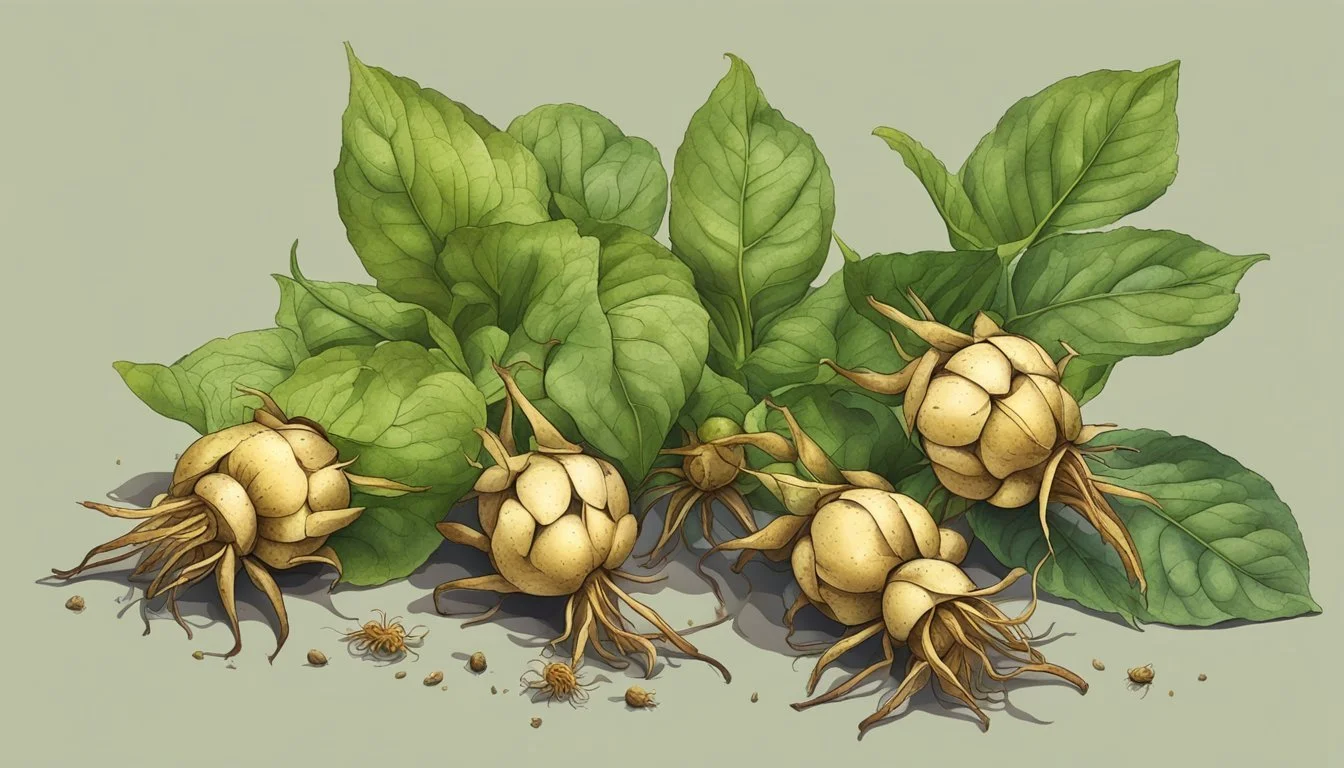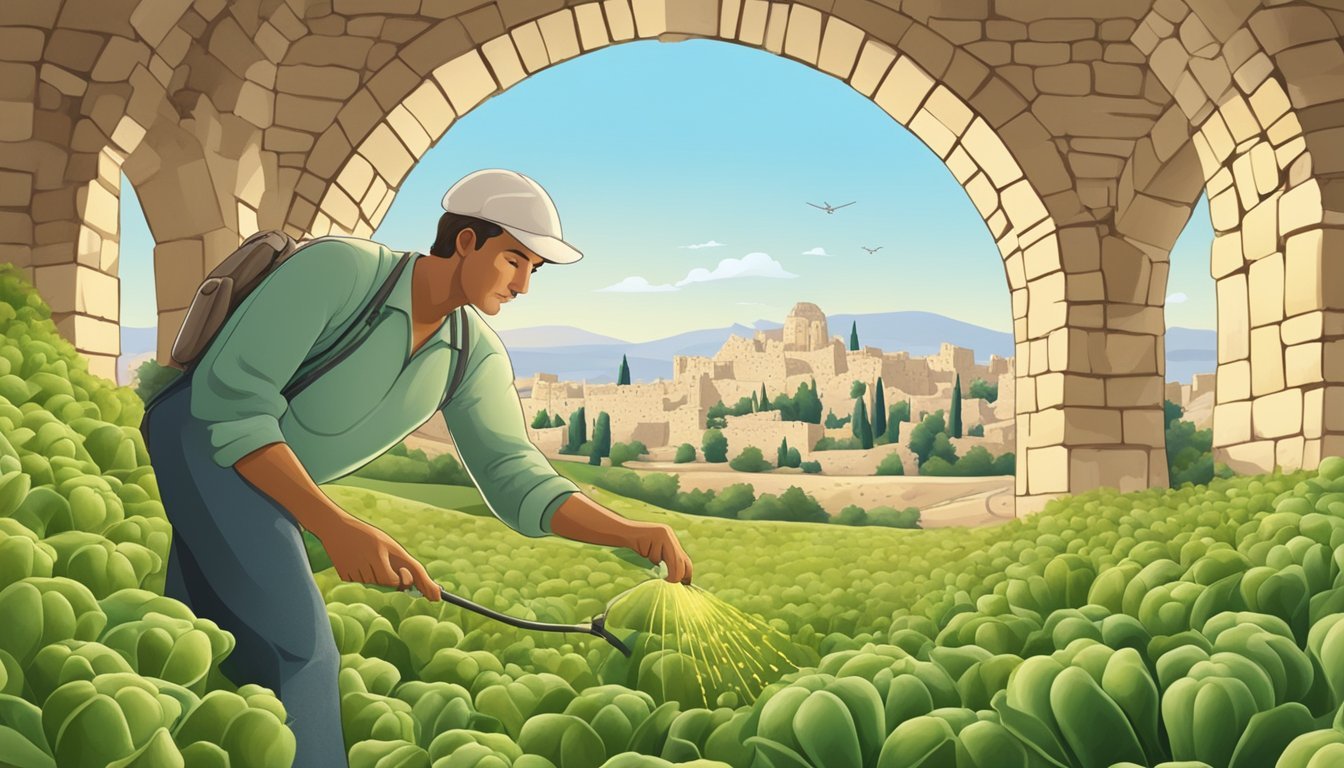Pest Control for Jerusalem Artichokes
Effective Strategies for Sunchokes Maintenance
Jerusalem artichokes (how long do artichokes last?), also known as sunchokes, are a hardy perennial favored for their crunchy tubers with a nutty flavor. These plants can thrive in a variety of conditions and are known for their vigorous growth. While appreciated for their low-maintenance nature and productivity, managing pests in Jerusalem artichoke crops is crucial to ensure healthy growth and yield. As with any crop, understanding the specific challenges and appropriate control measures is essential for success.
Pests that commonly affect Jerusalem artichokes range from small insects to larger animals. Insects such as wireworms and white grubs might attack the tubers, while rabbits and deer are known to feast on the stems and leaves. Effective pest control begins with early detection and consistent monitoring throughout the growing season. Cultivation practices such as proper spacing and crop rotation can also play a significant role in minimizing pest issues. When intervention is necessary, choosing the correct method is critical, be it mechanical barriers or organic and chemical controls, to minimize impact on the plants and surrounding environment.
Meticulous care in both planting and maintaining Jerusalem artichoke beds can deter the spread of these vigorous growers and prevent them from becoming invasive. For gardeners who wish to cultivate Jerusalem artichokes, familiarizing oneself with suitable control strategies for Jerusalem artichoke weeds will aid in keeping their growth under control while maximizing the harvest of their nutrient-rich tubers.
Understanding Jerusalem Artichokes
Jerusalem artichokes, known botanically as Helianthus tuberosus, offer a unique combination of nutritional benefits and energy derived primarily from the carbohydrate inulin. They are not only an asset to garden diversity but also a valuable addition to a health-conscious diet.
Botanical Profile
Helianthus tuberosus, commonly referred to as Jerusalem artichokes or sunchokes, is a species of sunflower native to North America. This hardy plant thrives in a variety of soil conditions and is recognized for its tall stature and bright yellow flowers. Often cultivated for its tubers, Jerusalem artichokes are prolific and can grow to substantial colonies if left unmanaged.
Family: Asteraceae
Height: Up to 3m (9 ft)
Flowering Period: Late summer to fall
Tuber characteristics: Brown-skinned, knobby, and with a white, crunchy flesh
Nutritional Information
Jerusalem artichokes are a significant source of the prebiotic fiber inulin, which is a type of starchy carbohydrate that supports gut health. They are low in fat and contain a range of minerals and vitamins.
Carbohydrate Content: High in inulin, low in starch
Fiber: Rich in dietary fiber
Energy: Provides a sustained release of glucose for energy
Vitamins and Minerals: Source of potassium, iron, and vitamin C
These tubers offer a versatile ingredient for both sweet and savory dishes, making them a beneficial addition to a balanced diet.
Cultivating Jerusalem Artichokes
Cultivating Jerusalem artichokes involves careful preparation of the soil, proper planting, and attentiveness to their environmental needs. These tubers, once established, can thrive with minimal care, offering both an edible crop and ornamental value.
Soil Preparation
Jerusalem artichokes prefer well-drained soil with a slightly acidic to neutral pH. Before planting, loosen the soil to a depth of at least 12 inches and mix in aged compost to add nutrients. Clearing the area of weeds ensures that the plants don’t face unnecessary competition for resources.
Planting Guidelines
Plant sunchoke tubers 2 to 3 inches deep with the eyes facing up, spaced about 12 to 18 inches apart. In a raised bed, space them slightly closer. This native American crop should be planted in early spring, once the risk of frost has passed.
Light and Temperature Requirements
Jerusalem artichokes flourish under full sun conditions, requiring at least six hours of sunlight daily. They are tolerant of a range of temperatures but grow best when daytime temperatures are between 65°F and 90°F.
Watering and Nutrition
Irrigate regularly, ensuring plants receive one inch of water per week. While Jerusalem artichokes are not heavy feeders, a balanced fertilizer can be applied sparingly to encourage lush foliage. Excessive fertilization should be avoided to prevent delay in tuber formation.
Growth and Development
The plants can reach heights of over 6 feet; hence, they may need support as they grow. Sunchokes usually take around 110 to 150 days to reach maturity and are best harvested after the first light frost of fall, which sweetens the tubers.
Pest Management Strategies
Effective pest management for Jerusalem artichokes (sunchokes) is crucial to prevent these plants from becoming invasive and to protect their health from common pests and diseases. A combination of organic control methods and preventative measures is recommended for a flourishing garden.
Common Pests
Jerusalem artichokes may encounter various pests, but the most prevalent are aphids and slugs, which can significantly damage the plants. Aphids tend to feed on the sap of the sunchoke, weakening it and potentially transmitting diseases. On the other hand, slugs are attracted to the moisture and tender leaves of both the Jerusalem and the globe artichoke, leading to holes and ragged edges on the foliage.
Organic Control Methods
To combat these pests organically, gardeners may employ several strategies. Introducing beneficial insects, such as ladybugs, can help naturally reduce aphid populations, as they are known predators. For slugs, diatomaceous earth or iron phosphate-based baits can be spread around the base of the plants to deter and eliminate these pests without resorting to harmful chemicals. Additionally, spraying a solution of water and neem oil can act as a natural repellent against aphids.
Preventative Measures
Taking steps to prevent pest infestations is vital for maintaining a healthy artichoke crop. Regularly inspecting plants and promptly removing any infested leaves can limit pest populations. Ensuring adequate plant spacing will improve air circulation, thus, reducing the risk of diseases that pests may spread. Installing barriers, such as copper strips, can discourage slugs from reaching the plants. Moreover, proper crop rotation can minimize the buildup of pests and diseases in the soil, safeguarding future sunchoke seeds and plants.
Harvesting and Storage
When it comes to Jerusalem artichokes, the key to maintaining their freshness and quality lies in understanding the correct timing for harvesting and the best practices for post-harvest handling and storage. Proper techniques can help prevent diseases and ensure that the tubers remain in good condition for longer periods.
Optimal Harvest Time
The best time to harvest Jerusalem artichokes is in autumn, after the first frost. This timing is crucial because the frost helps to convert the starches in the tubers into sugars, improving their flavor. They can be harvested throughout the winter months, ideally before mid-Spring, as the tubers begin to use their stored energy, leading to a decline in quality.
Post-Harvest Handling
Once harvested, the tubers should be handled gently to prevent bruising. They should be cleaned of soil and dried if possible. Any damaged tubers should be used immediately, as they can introduce diseases to others during storage. Tubers meant for long-term storage should not be washed, as excess moisture can promote decay.
Storage Techniques
For long-term storage, keeping Jerusalem artichokes at a temperature of about 32°F (0°C) to 34°F and at 85 to 95 percent relative humidity is recommended. They can be placed in plastic bags with holes for air circulation or in a container of damp sand to maintain humidity. These conditions can be replicated in a root cellar or a similar cool and dark environment. If a root cellar is not available, storing them in a refrigerator in a perforated plastic bag is a suitable alternative, allowing for a shelf-life of up to several months. Here are guidelines to maximize shelf life:
Root Cellar Storage: Place in damp sand at high humidity for 2 to 5 months.
Refrigerator Storage: Store in perforated plastic bags to prevent dehydration and shriveling.
By adhering to these guidelines, one can store and enjoy Jerusalem artichokes for an extended period without significant loss of quality or freshness.
Jerusalem Artichokes in the Kitchen
Jerusalem artichokes, also known as sunchokes, offer a versatile use in the kitchen from their nutty flavor to their ability to be a healthier choice for diabetics due to their inulin content. These tubers can be a delicious and nutritious addition to a variety of recipes.
Preparation and Cooking
Jerusalem artichokes require thorough cleaning before cooking, as dirt can often cling to their knobby surface. They can be scrubbed and eaten with the skin on, or peeled if preferred. The tubers are edible raw, offering a crisp, water chestnut-like texture, and can be sliced into salads or grated in slaws. To prepare these tubers for cooking, they should be chopped uniformly to ensure even cooking. Roasting, boiling, and sautéing are common methods, with roasting bringing out their inherent sweet and nutty flavor. In terms of recipes, they can replace potatoes in nearly any dish, making them a versatile ingredient for home cooks.
Health Benefits and Considerations
Jerusalem artichokes are exceptionally rich in inulin, a type of fiber that helps regulate blood sugar levels, which is particularly beneficial for diabetics. Unlike other high-carbohydrate foods, they have minimal impact on blood sugar. The high inulin content can promote gut health but may cause flatulence in some individuals. Moderation is key when introducing them into one's diet. Being low in calories yet high in nutrients, they bring substantial benefits, such as supporting heart health and improving digestive function.
Integrating Jerusalem Artichokes into the Garden
Integrating Jerusalem artichokes into the garden requires understanding their growth habits and environmental needs. It involves considering companion planting, crop rotation, and the edible tubers' landscaping potential.
Companion Planting
When planting Jerusalem artichokes, they benefit from being in proximity to certain plants that can enhance growth and protect against pests. Corn serves as a sturdy support for the tall stems, while the dense foliage of Jerusalem artichokes can suppress weeds, benefiting both plants. Additionally, planting with mint can deter pests naturally. A strategic companion planting plan helps in managing the garden's ecosystem and reducing the reliance on chemical controls.
Supportive companions: corn
Weed suppression: Jerusalem artichoke foliage
Natural pest deterrent: mint
Crop Rotation and Polyculture
Engaging in crop rotation with Jerusalem artichokes can prevent soil depletion and reduce disease buildup. Since Jerusalem artichokes are in the sunflower family, rotating them with non-related crops such as legumes can enhance soil nitrogen levels, benefiting subsequent plantings. Additionally, polyculture practices, or growing multiple crop species in the same space, can lead to a more resilient and productive garden.
Enhanced nitrogen: legumes
Disease prevention: non-related crops
Aesthetics and Landscaping Use
Jerusalem artichokes are not only a food source but also add aesthetic value to a garden with their tall stature and bright yellow flowers. They can be used as a windbreak or to create a visual screen, offering both beauty and functionality. Their flowers attract pollinators, enriching the garden's biodiversity. It's important to manage their vigorous growth with regular mulching, which can also improve soil quality over time.
Visual screen and windbreak: tall stems
Attracting pollinators: bright yellow flowers
Soil quality: regular mulching
Propagation and Breeding
Jerusalem artichokes, also known as sunchokes, can be propagated through seed propagation and tuber division, each method suitable for developing different varieties like 'Fuseau' or 'Stampede'.
Seed Propagation
Jerusalem artichokes are typically not grown from seeds, as they do not breed true to type. However, breeding new varieties from seeds can lead to unique characteristics. To grow from seeds, one needs to start in spring and provide optimal conditions for the seeds to germinate and produce shoots. It's a more experimental and less common method of propagation for sunchokes.
Tuber Division and Breeding Varieties
Dividing tubers is the most reliable method of propagating Jerusalem artichokes. It ensures the new plants will maintain the characteristics of the parent. In spring, gardeners can divide and plant individual tubers containing at least one eye or bud. Popular varieties like 'Fuseau' offer smooth and elongated tubers, while 'Stampede' and 'Red Fuseau' produce tubers with differing skin hues. Each tuber has the potential to grow into a new plant, making this method efficient for maintaining specific desirable traits in the crop.
Issues and Challenges in Growing Jerusalem Artichokes
Jerusalem artichokes, commonly referred to as sunchokes, pose several agronomic challenges, ranging from their propensity to spread aggressively to vulnerabilities against certain pests and diseases. These challenges require targeted strategies to ensure healthy and manageable crops.
Invasiveness and Containment
Jerusalem artichokes are known for their vigorous growth and can become invasive. They can rapidly take over an area, crowding out other plants. If not contained, sunchokes can propagate from small pieces of tuber left in the soil. To prevent sunchokes from spreading uncontrollably, it is advisable to plant them in contained beds. Invasiveness can be further managed by:
Installing barriers that go several inches into the ground.
Mowing down young plants to prevent them from establishing.
Disease and Pest Troubles
While Jerusalem artichokes are relatively hardy, they are not immune to diseases and pests. Common issues include:
Fungal diseases, such as Sclerotinia rot which affects the stems and tubers.
Pest attacks, notably from wireworms that can bore into the tubers.
These issues can be mitigated with the following methods:
Rotating crops to prevent disease build-up.
Ensuring proper drainage to reduce habitat suitability for wireworms.
Soil and Climatic Concerns
Jerusalem artichokes thrive in a variety of soil types; however, they are less tolerant to heavy clay soils that can promote tuber rot. Additionally, alkaline soils can limit growth. It is crucial to match the climate conditions as extreme temperatures can affect growth. Jerusalem artichokes perform best when they receive adequate moisture and sunlight. Addressing soil and climate issues involve:
Improving heavy clay soils by incorporating organic matter.
Testing soil pH and adjusting it if necessary to avoid extreme alkalinity.
Cultural and Historical Significance
Jerusalem artichokes, also known as sunchokes, are not only valued for their nutritious tubers but also hold a significant place in cultural and historical contexts. Indigenous to North America, this plant has been intertwined with the local ecology and Native American culture for centuries.
Historically, the tuber was a staple in the diet of various Native American tribes. Its cultivation is believed to have predated the arrival of Europeans, providing a reliable food source through winter months due to its ability to be stored for long periods.
When Europeans arrived in North America, they encountered Jerusalem artichokes as part of the local agriculture and diet. The plant was eventually taken back to Europe, where it gained popularity due to its adaptability and the ease of cultivation.
Jerusalem artichokes have been part of a rich agricultural history that extends beyond mere sustenance. They played a role in the trade between Native Americans and European settlers, and over time, became a culinary bridge between cultures, incorporating into various dishes and cuisines.
In summary, Jerusalem artichokes have been historically significant as a food crop for both Native Americans and Europeans. Their cultivation and use reflect a rich cultural interchange and a testament to the plants' adaptability and nutritional value.
Frequently Asked Questions
In addressing the concerns of gardeners and growers, this section provides targeted advice on pest control for Jerusalem artichokes. Each frequently asked question focuses on practical methods to tackle specific issues, ensuring the health and productivity of these plants.
What are the common pests that affect Jerusalem artichokes, and how can they be managed?
Jerusalem artichokes are susceptible to pests such as wireworms and white grubs. Wireworms can be reduced by crop rotation, while beneficial nematodes can help control white grub populations.
How can I identify and treat diseases in my Jerusalem artichoke plants?
Common diseases include fungal infections like Sclerotinia rot, which can be identified by soft, rotting stems. Proper air circulation and avoiding overly wet soil are crucial prevention tactics.
Are there any natural or organic methods for protecting Jerusalem artichokes against pests?
Natural methods include introducing predatory insects, such as ladybugs, to control aphid populations. Diatomaceous earth can deter crawling pests without harmful chemicals.
Can companion planting help with pest control in Jerusalem artichokes, and what species are recommended?
Companion planting with marigolds or thyme can help repel certain pests due to their strong scents. Marigolds deter nematodes, and thyme can repel cabbage moths.
What pesticides are safe and effective for use on Jerusalem artichokes?
Pesticides containing pyrethrins, derived from chrysanthemum flowers, are considered safe for use on Jerusalem artichokes. They effectively target a wide range of pests when used as directed.
How often should Jerusalem artichoke plants be inspected for pest issues, and what signs should I look for?
Regular weekly inspections are recommended to catch early signs of pest infestations, such as damaged leaves and stems, or the presence of insects and larvae. Early detection is key in effective management.








